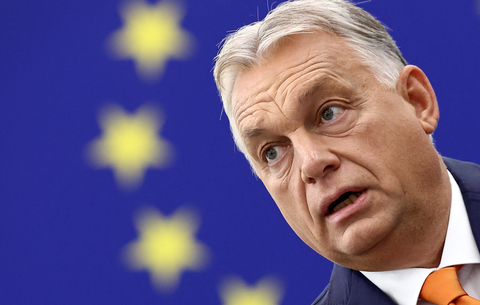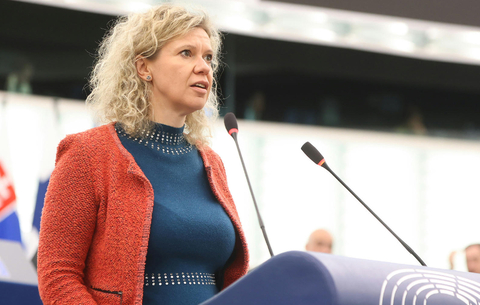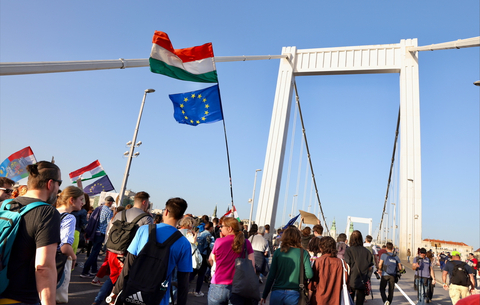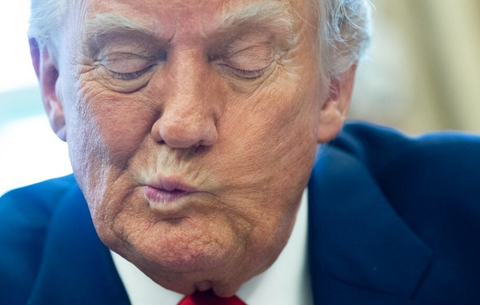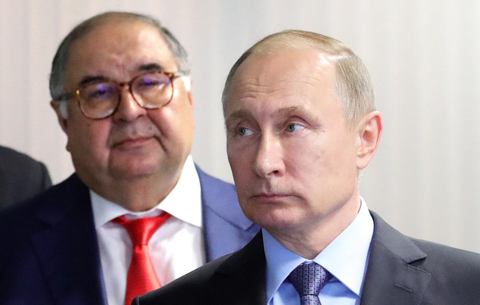Anxious relatives
What matters more? Solidarity with a small democracy whose inhabitants are our linguistic kin, or a summit with the head of a continent-sized nuclear power who is working to re-establish his country's superpower prestige? Ferenc Gyurcsany chose the former by attending the council of the Finno-Ugric peoples. That the Estonian prime minister did not attend did not prevent him from representing Estonia's point of view, he said. Fidesz does not agree.
Zsolt Nemeth, chair of the parliamentary foreign affairs committee believes that the prime minister, "by attending the meeting, is further undermining Hungary's Euro-Atlantic relations." It is quite true that Jose Manuel Barroso stood up for the Baltic state when riots broke out in Tallinn over the Russian monument affair. It would seem that, just as with gas supplies, our country's diplomacy takes a softer line when Moscow flexes its muscles than Brussels. And Fidesz, which called Gyurcsany a lackey, an unprincipled servant of the Union, now seeks to set itself up as the communautaire party. Before jumping to conclusions, let us ask what this dispute between the Russian bear and Estonia's blue lion is about, exactly?
Until 1918, the Estonians of the Tsar's empire had neither a state nor local self-determination. Russification meant there were not even any Estonian-language secondary schools. Despite this, after World War I, the democratic government in Tallinn declined to persecute the Russian minority, even giving Russians administrative and cultural autonomy. An authoritarian regime replaced the multi-party system in 1934, but even then there was little serious discrimination against the Slavic-speaking population. After 1940, when the Molotov-Ribbentrop pact handed the eastern Baltic to the Soviet empire, Soviet armies carried out a cruel programme of ethnic cleansing and deportation, which was repeated in 1944-45, when the Nazis occupied the area. A programme of systematic settlement was begun with the aim of changing the ethnic balance of the region. Originally, the Russian minority made up just 8 per cent of the population. This had grown to 30 per cent by the mid-1980s. The Estonians' passive resistance meant that Russian language teaching was just as successful there as it was with us. In the Soviet era, two thirds of our Finno-Ugric relatives had little or no knowledge of Puskin's language.
Still, the cat-and-mouse relationship between the Baltic nation, which won back its independence in 1991, and Russia can hardly be explained as a story of national injury, nor as that of a colonial great power versus a small country straining against the bonds of servility. It is a conflict between different values and civilisations, the product of a cultural faultline. The Baltic region is a western island in a sea of Byzantine and Pravoslav culture. It is an area where a need is felt for common Euro-Atlantic ideals like pluralism, a free market, freedom of opinion, independent social sub-structures, and the separation of powers. But the Putin Kremlin that followed the Gorbachev-style reformers and the Yeltsin era is more reminiscent of the Soviet empire-building mentality. People who think differently are brutally suppressed, and there are signs of political attacks and the emergence of a KGB-style oligarchy. The spring street riots must have confirmed the suspicions of those Estonians who saw the Russian minority as a fifth column of the Muscovite neo-colonisation.
It's an unfair, generalising exaggeration. And it's also true that since it's birth, this new Baltic democracy has contained the seeds of today's tensions. They could hardly have expected loyalty on the part of this minority, since "your homeland is where you have rights." Russians who were moved there during the Communist era were never granted citizenship, meaning they had no civic rights. More precisely, Estonian citizenship could only be obtained by exam. This was a frustration for those who, earlier under the Soviet system, had counted as a privileged group. Removing the war memorial was just pouring oil on a mound of smouldering embers.
Ferenc Gyurcsany's absence would certainly have caused the Siberian bear to grumble. But at that price, it might have been a gesture of solidarity worth making towards a sister nation, and Russian-Hungarian relations would probably have survived the strain.
László Tamás Papp

